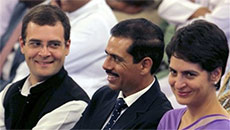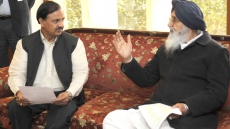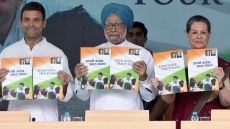Terming the killing of Sikhs during the 1984 riots as a “crime against humanity”, the CBI has likened it with mass extermination of Jews by Nazis, mass killing of Bangladeshis by Pakistan Army and killing of Armenians by Kurds and Turks.
“As such, this case has to be viewed in the larger context of mass crimes and requires a different approach than a case of normal murder/rioting,” CBI told the Supreme Court, opposing former Congress leader Sajjan Kumar’s bail plea.
Kumar has challenged a Delhi High Court order convicting and sentencing him to life imprisonment for killing of five Sikhs in Raj Nagar Part-I area in Palam Colony in South West Delhi on November 1 and 2, 1984, and burning down a Gurudwara in Raj Nagar Part-II during the riots.
Kumar,73, had surrendered before a Delhi court on December 31 to serve life imprisonment for the "remainder of his natural life".

Almost 3,000 people were killed, most of them in Delhi, in the anti-Sikh riots that broke out following the assassination of then prime minister Indira Gandhi on October 31, 1984.
“The brutal murder of innocent Sikhs during the 1984 riots fall under the category of crimes against humanity on parity with well known genocides worldwide like large scale killing of Armenians by Kurds and Turks, mass extermination of Jews by Nazis, mass killing of Bangladeshi citizens by the sympathizess of Pakistani Army and mass killing during various ethnic riots within India also,” CBI told the top court in its affidavit filed last week.
“In this case, the minority community was targeted by the spearheaded attacks of dominant political actors like the applicant/convict and duly facilitated by law enforcement agencies,” it said.

The agency opposed Kumar’s bail plea saying he was a leader with “a large political clout” and “capable of influencing/terrorising witnesses”. A fair trial in other 1984 riots cases pending against him would not be possible if he was released on bail, the agency submitted.
The Supreme Court is likely to take up the matter on March 25—a month after Justice Sanjiv Khanna recused himself from the hearing.
The Supreme Court had on January 14 issued notice to the CBI on Kumar's petition challenging the Delhi High Court's verdict sentencing him to life imprisonment in a 1984 anti-sikh riots case. He has sought suspension of sentence and grant of bail pending final adjudication of his appeal.
Bringing to justice the first-ever senior Congress functionary for his role in the 1984 Sikh carnage, the Delhi High Court had on December 17 last convicted former MP Sajjan Kumar for criminal conspiracy to murder five people of the minority community and sentenced him to imprisonment for the rest of his natural life.
Reversing Sajjan Kumar’s April 30, 2013, acquittal order passed by Delhi’s Karkardooma Courts, a Delhi High Court Bench headed by Justice S Muralidhar had said the trial court failed to address the charges of criminal conspiracy against Kumar. Justice Muarlidhar too had termed it a “crime against humanity”.
“The criminals escaped prosecution and punishment for over two decades. It took as many as 10 committees and commissions for the investigation into the role of some of them to be entrusted in 2005 to the CBI, 21 years after the occurrence,” the high court had said.


